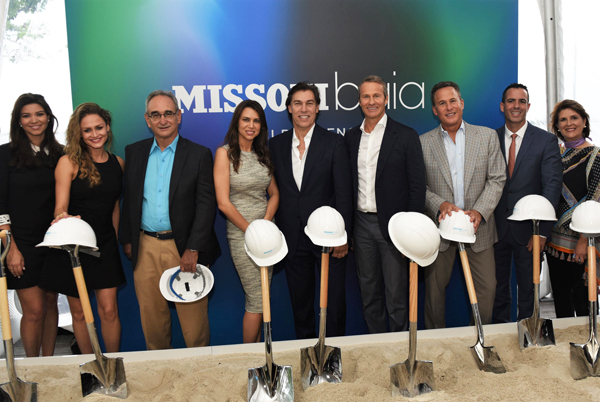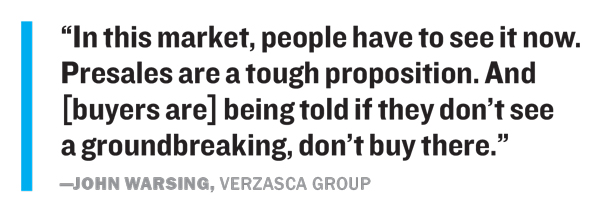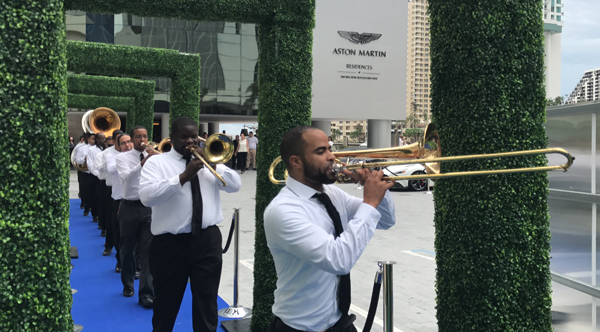On a cloudy afternoon in mid-October, a crowd gathered on the waterfront terrace of the Missoni Baia sales tower in Edgewater, Champagne glasses in hand, as a man wearing a baby-blue sequined jumpsuit circled Biscayne Bay on a jetpack. He clasped a woman wearing a sparkly nude bodysuit, who tooted out a jazzy tune on the saxophone while the pair hovered 12 feet above the water.
At the end of the performance, the duo retrieved a bottle of Champagne on a jet ski floating on the water and glided over to Russian billionaire developer Vlad Doronin and Missoni co-founder Rosita Missoni. As the bubbly flowed, the developers toasted the condo project that won’t go vertical until at least next year and which, as of press time, did not have a construction loan secured.
Now that bank loans have largely dried up for new condo projects, it’s mostly those with deeper pockets — developers like Doronin and the Coto family of Argentina — who are forging ahead. Those lucky few with the means are pulling out all the stops in pricey groundbreaking celebrations to lure buyers and thus instill lender confidence, even as developers who are much closer to delivery struggle to sell their remaining inventory.
In this cycle, banks typically require that at least 50 to 60 percent of units are sold before they will fund construction of a project. South Florida’s boom-bust reputation has led local lenders to be overly cautious about new condo projects, Faisal Ashraf, founder and CEO of Lotus Capital Group, said. “Some developers would say [local banks] have overlearned the lessons of history.”
The presales crucial to getting financing are increasingly hard to come by. Doronin’s OKO Group launched sales of the 57-story, 249-unit Missoni Baia tower in the spring of 2016 and a year later replaced Cervera Real Estate with Fortune International Group as its exclusive sales and marketing firm. The developer and both brokerages repeatedly declined to provide a total dollar amount for sales to date. But Edgardo Defortuna, president and CEO of Fortune, said his team sold nearly 30 units, or roughly 11 percent of the building, just between July and October.
Doronin said OKO Group and its partner Cain International are currently funding construction of Missoni Baia with equity. He said he is in talks with multiple lenders and expects to close on about $100 million in financing in the next few months. The developer said if he doesn’t find a loan with agreeable terms, he will use equity to complete the project.

From left: Ena Espino, Catalina Martinez, Luis Revuelta, Inga Leshchinsky, Edgardo Defortuna, Vlad Doronin, Jim Cohen, Rafael Gonzalez and Liliana Pinto-Torres celebrated the groundbreaking for Missoni Baia in October.
But sources said it’s worrying for those seeking financing that a number of projects already under construction haven’t reported increases in sales in months.
If developers aren’t building after attempting to presell units for several months, buyers are hesitant to put units under contract. While developers do not need to have a groundbreaking to put units under contract, they typically can require buyers to put more money down at groundbreaking, swelling their available funds. Sources estimate that developers on average ask their buyers for about 10 percent more at groundbreaking.
The lack of a concrete construction timeline recently sank Fasano Residences in Miami Beach. HFZ Capital Group canceled the project in November as buyers were growing increasingly anxious about the delay in groundbreaking, Douglas Elliman’s Jay Parker told The Real Deal. Construction moving forward adds to a project’s credibility, Defortuna said.
If Doronin and others are to be believed, a few theatrics certainly don’t hurt, either.
With a blast of confetti, a fireworks display, a mini-marching band and DJ Irie spinning tunes, the October groundbreaking of Aston Martin Residences paid dividends almost immediately, sources claimed. G&G Business Developments, owned by the Coto family, rolled out the green carpet — the color associated with car racing in the U.K. — to celebrate the groundbreaking of the luxury-car-branded tower at 300 Biscayne Boulevard Way. G&G CEO German Coto said the fireworks were his idea, just as the jetpack performance for Missoni Baia was Doronin’s brainchild.
Alicia Cervera Lamadrid, principal of Cervera Real Estate, said Aston Martin Residences has been “swamped” with buyer interest since the groundbreaking, thanks in large part to international coverage of the event by various media outlets. Like Doronin, Coto did not want to disclose the cost of the groundbreaking event.
The developer launched sales of the 391-unit, 66-story project in December 2016 and broke ground with about 25 percent of its units sold, for $160 million in sales. Coto expects to go vertical with construction in about a year and deliver the building in 2021. The projected sellout of the project is $1 billion. He said he wasn’t overly concerned with securing construction financing, which it doesn’t currently have. He said if need be, he would build the sail-shaped high-rise without a loan.
 Smaller projects are also finding that an extravagant groundbreaking helps sales. At the Monad Terrace sales gallery in mid-October, JDS Development followed a presentation of its 59-unit project with a marching band that led guests outside to the South Beach site, where a crane ceremonially broke ground to a blast of fireworks.
Smaller projects are also finding that an extravagant groundbreaking helps sales. At the Monad Terrace sales gallery in mid-October, JDS Development followed a presentation of its 59-unit project with a marching band that led guests outside to the South Beach site, where a crane ceremonially broke ground to a blast of fireworks.
Parker of Douglas Elliman Florida, who is marketing Monad, said his sales team has sold a couple of units since then — something he partially attributes to the groundbreaking event. “I do think it’s a material consideration. The biggest challenge we face in today’s market is urgency,” Parker said, adding that buyers ask, “Why should I put down 20, 30, 40, 50 percent when you don’t even know when a project will be completed?” Once a developer breaks ground, “you know you’ve overcome one of the buyers’ biggest concerns,” he said.
Monad, which is less than 50 percent sold, scored a $62.5 million mortgage, also in October. The financing includes a $20 million senior loan from Bank of the Ozarks and $42.5 million of mezzanine financing from Vanbarton Group. The developer declined to provide the dollar volume of sales, but news of a previous lender filing a foreclosure suit in June — the suit was dismissed in October — has impeded sales, sources said.
And sales “are how the loans get paid back, so they are crucial to the equation,” said James Shindell, a real estate partner at Bilzin Sumberg who arranged a $236 million construction loan for Brickell Flatiron this year and the financing for Turnberry Ocean Club, among others.
The Turnberry Ocean Club secured lending seven months after a groundbreaking ceremony in November 2016, landing a $259 million construction loan from Bank of the Ozarks in June.

Aston Martin Residences’ over-the-top groundbreaking ceremony in October led to many sales inquiries due to media coverage of the event, a source claimed.
When the loan was secured, the project had reached $300 million in sales volume, according to a spokesperson. The development’s total sellout is nearly $988 million, according to documents filed with the New York attorney general in 2015, so a back-of-the-napkin calculation suggests the presales at the time could have accounted for around 30 percent of units, less than what lenders usually look for. The fact that Turnberry is a well-known South Florida developer and the project is in a good location could account for the bank’s support. The project went vertical with its 154-unit, 54-story building in December.
Some projects — even at this point in the cycle — have been able to celebrate their presale success at their groundbreakings.
In November, Verzasca Group held a groundbreaking celebration for Aurora, a 61-unit luxury condo tower planned for 17550 Collins Avenue in Sunny Isles Beach. The project was nearly 60 percent presold at the time, according to John Warsing, director of sales.
With enough presales to get a loan, the developer is now in talks with three banks for a construction loan, which Verzasca expects to close on by the beginning of 2018, Warsing said. Crews are planning to pour the foundation for the 17-story tower during the first quarter of 2018 and go vertical shortly afterward. It’s slated for delivery in early 2020.
As with the extravagant groundbreaking parties, commencing construction without many presales demonstrates the “seeing is believing” model of drumming up buyer interest.
But how do developers pay for that? If they’re lucky, with the financial backing of silent partners if they can’t foot the bill themselves, Warsing said, pointing to Regalia in Sunny Isles as a prime example of that. The 39-story beachfront condo building was completed in 2014 by a group led by Kevin Venger and Louis Montello, but it was still selling units this year. They went ahead and built the building without significant presales, and it’s a success, Warsing argued.
“In this market, people have to see it now. Presales are a tough proposition. And [buyers are] being told if they don’t see a groundbreaking, don’t buy there,” he added.
Lotus Capital’s Ashraf told TRD there’s hope for developers still looking for financing — it’s just less likely that the money will come from the traditional players.
Debt funds, insurance companies and international pension funds are among those still looking to get involved in South Florida at this point in the cycle. Ashraf just arranged a nearly $400 million financing package for Via Mizner, a mixed-use project in Boca Raton being developed by Penn-Florida Companies. The developer went with New York-based Mack Real Estate Credit Strategies, a nonbank lender, as the lead.
Ashraf, who previously worked for CCRE and Credit Suisse, is also working on a separate $100 million construction loan for the condo component of Penn-Florida’s project, set to close this year. He did not reveal who the lender was. Via Mizner will include a 366-unit luxury apartment building, an 88-unit condo tower, a 164-key Mandarin Oriental Hotel & Resort and 60,000 square feet of retail.
Charles Penan, managing director of the Aztec Group, said that he didn’t think banks were being overly cautious, but rather that they’re having “capacity issues,” with some borrowers unable to pay down their debt in a timely manner. For the financing that is available, “the loan-to-cost might be lower or the cost of capital might be higher,” he said.
Penan, like Ashraf, also said that large institutional funds like the Blackstone Group and Starwood Property Trust are still interested in lending in South Florida.
“While developers are still seeking construction financing, the requests are different than before. Some lenders and developers are more willing to use a different structure with mezzanine financing or an equity partner,” Penan said.
Two Roads Development, along with entities managed by New York-based investment firm DW Partners, is doing just that, using mezzanine lending to move forward with its project Elysee Miami. In October, the developer — which held a groundbreaking ceremony with a Champagne reception on Dec. 13 — closed on phase one of its construction financing for the 57-story, 100-unit skyscraper planned for Edgewater. Two Roads launched sales about two years ago for the project, which is now roughly 45 percent sold, developer Taylor Collins said.
Mosaic Real Estate Credit, a California-based alternative lender, provided the $16.5 million loan, which covers the first phase of construction. The lender provides bridge and construction debt capital as first mortgage loans, mezzanine and preferred equity structures.
Two Roads had term sheets from two traditional banks and three from private lenders, Collins said. Mosaic was “pretty aggressive on rates and terms and [is] not an institutional lender, so not subject to tough regulations,” he added.
The lender was also more generous on its loan coverage ratio, allowing Two Roads to borrow money sooner for construction. “They understood the market and that we wanted to start earlier. Buyers today want to understand that a project is not only going to start construction but get completed,” Collins said.
Elysee Miami’s crews are now completing a sea wall and installing test piles, and a foundation pour is scheduled for early next year. Getting construction financing “really has made a huge difference” for presales, Collins said.
Banks and funds that are still looking to underwrite condo projects this cycle are “going to care deeply about the experience, the wherewithal, the ability of the developer,” Shindell said. “They’re going to have to see the presales that give them confidence the money is going to come in.”
